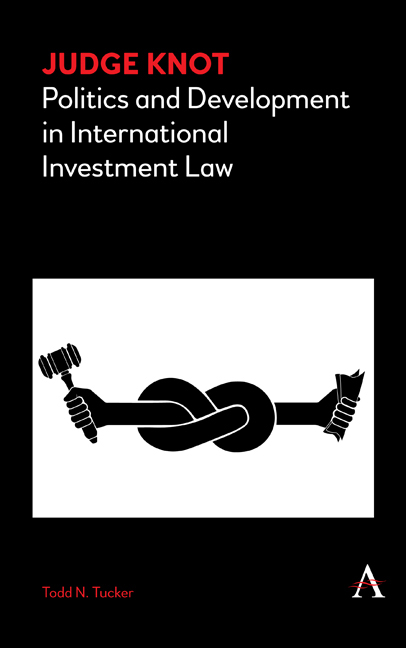Book contents
- Frontmatter
- Dedication
- Contents
- List of Illustrations
- Acknowledgments
- Introduction
- Chapter One Entering the Judge Knot
- Chapter Two Historicizing Investment Law
- Chapter Three Why Investors Demand Investment Law
- Chapter Four Why Arbitrators Supply Investment Law
- Chapter Five Why Investment Law Lasts
- Chapter Six Toward Global Popular Constitutionalism
- Appendix Methodology
- Index
Chapter Four - Why Arbitrators Supply Investment Law
Published online by Cambridge University Press: 21 June 2018
- Frontmatter
- Dedication
- Contents
- List of Illustrations
- Acknowledgments
- Introduction
- Chapter One Entering the Judge Knot
- Chapter Two Historicizing Investment Law
- Chapter Three Why Investors Demand Investment Law
- Chapter Four Why Arbitrators Supply Investment Law
- Chapter Five Why Investment Law Lasts
- Chapter Six Toward Global Popular Constitutionalism
- Appendix Methodology
- Index
Summary
Imagine a purely private market in judicial services. People would offer their services as judges, and disputants would select the judge whom they mutually found most acceptable. The most popular judges would charge the highest fees, and competition among judges would yield the optimum amount and quality of judicial services at minimum social cost [… O]ne could even] give judges property rights in precedents—e.g., a royalty every time one of their decisions was cited.
—William Landes and Richard Posner (Adjudication as a Private Good, 1979)Serving as an arbitrator is a relatively poor way to get rich. Working as counsel to an investor can net a private lawyer more than $1,000 per hour. In contrast, arbitrators (at least at the World Bank) earn $3,000 per day. What an arbitrator gets in a day of hearings, counsel earns by lunch. Moreover, serving as counsel can fill up significant chunks of one's professional calendar for years, while an arbitrator who charges for more than a few weeks of work would seem overly costly, raise eyebrows, and risk future appointments.
What motivates arbitrators to supply investment law? I argue that a big part of the answer lies in inter- arbitrator relationships and collegial norms, even if money explains part of the motivation. This chapter represents the first scholarly attempt to formally model arbitration tribunals. It is derived from the first- hand stories of the only people who have seen inside the black box of deliberation and interpretation: the arbitrators themselves. Applying grounded theory methods (see Appendix), I show how arbitrators’ personal strategies, interests and affinities make for a perpetual fount of uneven law creation. The result is an investment arbitration system that relies heavily on the ingenuity, self- regulation and self- policing of a sprawling cohort of untenured adjudicators. The portrait in the following pages shows that arbitrators are human, like the rest of us and like other lawyers. They drink, they bicker and they gang up on one another. But they also resolve tricky issues of international political economy without armies of government or corporate bureaucrats helping them. Can we learn from their model?
- Type
- Chapter
- Information
- Judge KnotPolitics and Development in International Investment Law, pp. 101 - 122Publisher: Anthem PressPrint publication year: 2018



